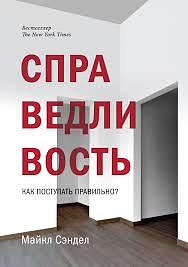Take a photo of a barcode or cover
"The way things are does not determine the way they ought to be."
"The idea that persons should be free to choose their ends for themselves is itself a powerful moral idea. But it does not tell you how to live your life. It only requires that, whatever ends you pursue, you do so in a way that respects other people's rights to do the same. The appeal of a neutral framework lies precisely in its refusal to affirm a preferred way of life or conception of the good."
"Egalitarian liberals favor civil liberties and basic social and economic rights--rights to health care, education, employment, income security, and so on. They argue that enabling individuals to pursue their own ends requires that government ensure the material conditions of truly free choice."
"Human beings are storytelling beings. We live our lives as narrative quests."
"The idea that persons should be free to choose their ends for themselves is itself a powerful moral idea. But it does not tell you how to live your life. It only requires that, whatever ends you pursue, you do so in a way that respects other people's rights to do the same. The appeal of a neutral framework lies precisely in its refusal to affirm a preferred way of life or conception of the good."
"Egalitarian liberals favor civil liberties and basic social and economic rights--rights to health care, education, employment, income security, and so on. They argue that enabling individuals to pursue their own ends requires that government ensure the material conditions of truly free choice."
"Human beings are storytelling beings. We live our lives as narrative quests."
This was good as an introductory book because it was fairly simplified. I could have done without the filler sentences I.e. ‘Let me see if I can explain this concept’. No don’t try to explain anything, be felicitous, edit that superfluous nonsense out and present the philosophy. However, despite the simplicity it has influenced the way I will engage in public debate and how I view my role as a citizen in a polis. I appreciate anything which can make me think so I’ve given it 4 stars.
Quotes and ideas I enjoyed and will take away:
‘The more we regard our success as our own doing, the less responsible we feel for those who are left behind.’
‘Debates about justice and rights are often, unavoidably about the purpose of social institutions, the goods they allocate and the virtues the honour and reward. Despite our best attempts to make law neutral on such questions, it may not be possible to say what’s just without arguing about the nature of the good life.’
‘Justice is not only about the right way to distribute things, it is also about the right way to value things.’
The idea that the more the upper classes can pay for different services, schools, healthcare etc, the less involved they are in government/community provided services and the less inclined they are to appreciate their taxes being used for them. However, if everyone were to be striving for a common goal and mixing in every part of social, civic life, perhaps everyone would be better off.
This excerpt from Aristotle’s book The Politics:
The man who is isolated - who is unable to share in the benefits of political association, or has no need to share because he is already self-sufficient- is no part of the polis, and must therefore be either a beast or a god.’ (We only fulfil our nature when we exercise our faculty of language, which in turn requires that we deliberate with others about right and wrong, good and evil, justice and injustice.)
This excerpt from JFK’s speech at the University of Kansas on March 18, 1968:
Even if we act to erase material poverty, there is another greater task, it is to confront the poverty of satisfaction - purpose and dignity - that afflicts us all.
Too much and for too long, we seemed to have surrendered personal excellence and community values in the mere accumulation of material things. Our Gross National Product, now, is over $800 billion dollars a year, but that Gross National Product - if we judge the United States of America by that - that Gross National Product counts air pollution and cigarette advertising, and ambulances to clear our highways of carnage. It counts special locks for our doors and the jails for the people who break them. It counts the destruction of the redwood and the loss of our natural wonder in chaotic sprawl. It counts napalm and counts nuclear warheads and armored cars for the police to fight the riots in our cities. It counts Whitman's rifle and Speck's knife, and the television programs which glorify violence in order to sell toys to our children. Yet the gross national product does not allow for the health of our children, the quality of their education or the joy of their play. It does not include the beauty of our poetry or the strength of our marriages, the intelligence of our public debate or the integrity of our public officials.
It measures neither our wit nor our courage, neither our wisdom nor our learning, neither our compassion nor our devotion to our country, it measures everything in short, except that which makes life worthwhile.
And it can tell us everything about America except why we are proud that we are Americans.
Quotes and ideas I enjoyed and will take away:
‘The more we regard our success as our own doing, the less responsible we feel for those who are left behind.’
‘Debates about justice and rights are often, unavoidably about the purpose of social institutions, the goods they allocate and the virtues the honour and reward. Despite our best attempts to make law neutral on such questions, it may not be possible to say what’s just without arguing about the nature of the good life.’
‘Justice is not only about the right way to distribute things, it is also about the right way to value things.’
The idea that the more the upper classes can pay for different services, schools, healthcare etc, the less involved they are in government/community provided services and the less inclined they are to appreciate their taxes being used for them. However, if everyone were to be striving for a common goal and mixing in every part of social, civic life, perhaps everyone would be better off.
This excerpt from Aristotle’s book The Politics:
The man who is isolated - who is unable to share in the benefits of political association, or has no need to share because he is already self-sufficient- is no part of the polis, and must therefore be either a beast or a god.’ (We only fulfil our nature when we exercise our faculty of language, which in turn requires that we deliberate with others about right and wrong, good and evil, justice and injustice.)
This excerpt from JFK’s speech at the University of Kansas on March 18, 1968:
Even if we act to erase material poverty, there is another greater task, it is to confront the poverty of satisfaction - purpose and dignity - that afflicts us all.
Too much and for too long, we seemed to have surrendered personal excellence and community values in the mere accumulation of material things. Our Gross National Product, now, is over $800 billion dollars a year, but that Gross National Product - if we judge the United States of America by that - that Gross National Product counts air pollution and cigarette advertising, and ambulances to clear our highways of carnage. It counts special locks for our doors and the jails for the people who break them. It counts the destruction of the redwood and the loss of our natural wonder in chaotic sprawl. It counts napalm and counts nuclear warheads and armored cars for the police to fight the riots in our cities. It counts Whitman's rifle and Speck's knife, and the television programs which glorify violence in order to sell toys to our children. Yet the gross national product does not allow for the health of our children, the quality of their education or the joy of their play. It does not include the beauty of our poetry or the strength of our marriages, the intelligence of our public debate or the integrity of our public officials.
It measures neither our wit nor our courage, neither our wisdom nor our learning, neither our compassion nor our devotion to our country, it measures everything in short, except that which makes life worthwhile.
And it can tell us everything about America except why we are proud that we are Americans.
informative
reflective
medium-paced
Michael Sandel is a professor of government at Harvard. I came about this book after catching a PBS series based upon a popular course he teaches of the same name. I highly recommend both the 12-part series (which you can watch online) and the accompanying book.
Sandel covers some major schools of philosophy, including utilitarianism and libertarianism, as well as philosophers, such as Kant, Rawls and Aristotle. He applies these to present-day examples, such as stem-cell research and same-sex marriage and raises hypothetical situations to help illustrate. Usually his application of the theories is straightforward but the explanations of the theories and concepts themselves (such things as Kant’s Categorical Imperitive) will take more effort on the reader’s part. But it’s worth it.
Sandel covers some major schools of philosophy, including utilitarianism and libertarianism, as well as philosophers, such as Kant, Rawls and Aristotle. He applies these to present-day examples, such as stem-cell research and same-sex marriage and raises hypothetical situations to help illustrate. Usually his application of the theories is straightforward but the explanations of the theories and concepts themselves (such things as Kant’s Categorical Imperitive) will take more effort on the reader’s part. But it’s worth it.
challenging
informative
reflective
medium-paced
informative
slow-paced
informative
reflective
medium-paced
Had to read this for school. Not a book I would ever pick up for myself but it was really interesting
Philosophy isn't really my thing, but it was pretty ok for a studybook. I feel like the Dutch translation didn't do much justice tot this book, the original quotes are way better.
Engaging, well-rounded, and concise -- basically a crash course in philosophy without unnecessary jargon or insufferable philosophy bros
Took me a while, but it was easily readable for the lay-person and brought up some interesting points for me.



